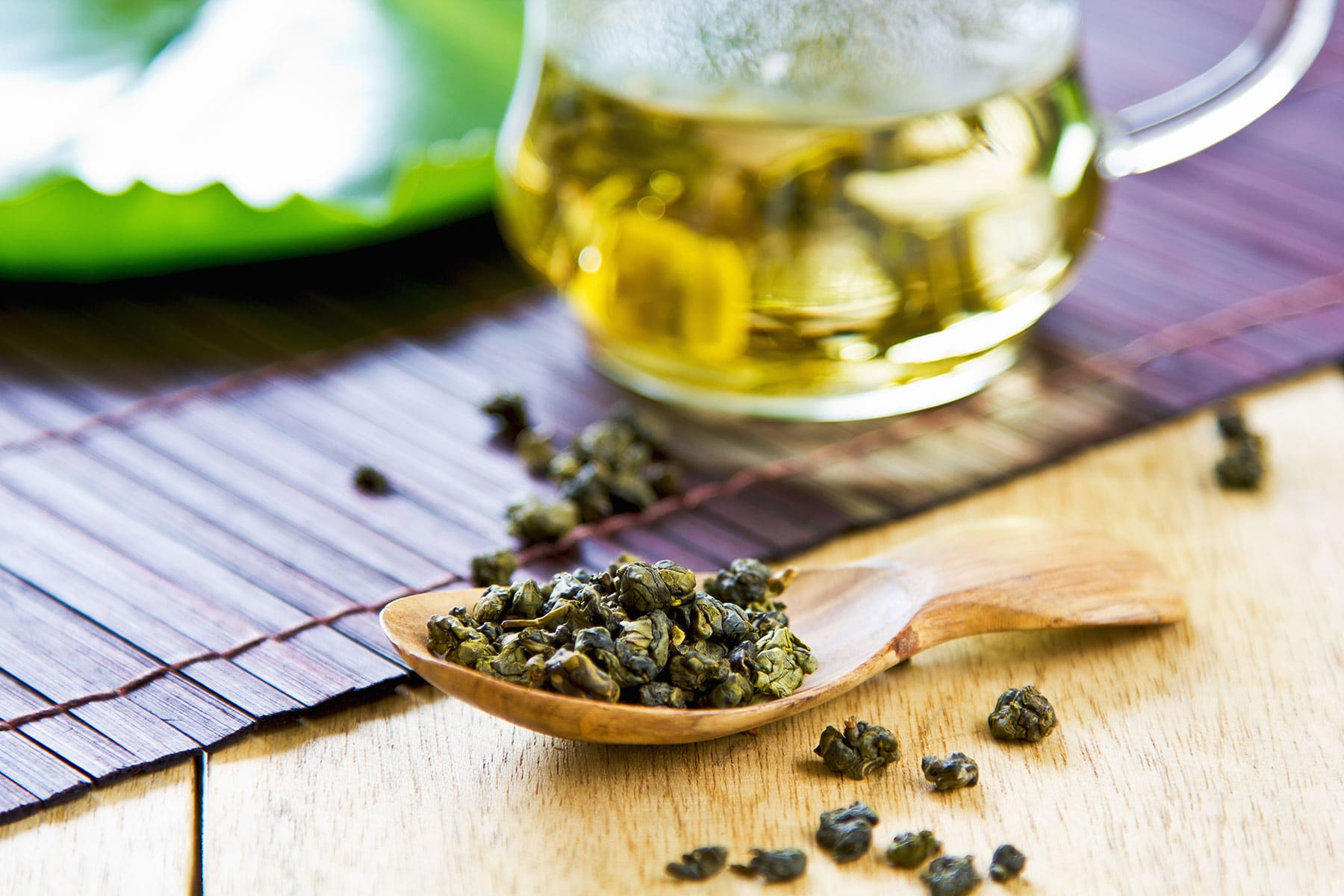
Table of Contents
Although Oolong tea only makes up a small percentage of global tea production and consumption, it is a unique and valuable variety worth exploring.
With characteristics of both dark and green teas, Oolong tea offers a range of potential health benefits. Drinking Oolong tea may assist in weight loss and stress reduction.
This article provides comprehensive information on Oolong tea and its associated health benefits.
What is oolong tea?
Oolong tea is a traditional Chinese drink made from the leaves of the Camellia sinensis plant, which is also used to make green and black tea. The difference lies in the processing of the leaves. The process of oxidation, which is a chemical reaction that happens when the leaves are exposed to air, creates the different colors and flavors of green, dark, and oolong teas.
Green tea is created from fresh leaves that have not undergone oxidation, black tea is made from leaves that have been fully crushed to enhance oxidation, and oolong tea is created from leaves that have been wilted in the sun and slightly bruised to create partial oxidation.
Nutrients in oolong tea
Oolong tea, like black and green teas, is rich in vitamins, minerals, and beneficial antioxidants. A cup of oolong tea contains small amounts of calcium, magnesium, and potassium.
It also contains around 38mg of caffeine. In comparison, a cup of green tea generally has about 29mg of caffeine.
Oolong tea is known for its high content of antioxidants, particularly tea polyphenols such as theaflavins, thearubigins, and EGCG. These antioxidants are responsible for many of the health benefits associated with oolong tea.
In addition, Oolong tea also contains L-theanine, an amino acid that has been shown to promote relaxation and improve cognitive performance.
Oolong tea may help protect against diabetes
Tea has been generally found to have benefits in protecting against diabetes and the complications that may arise from it. This is believed to be due to tea’s ability to ease insulin resistance and decrease inflammation, among other mechanisms.
Studies from 2021 and a review from 2019 both report links between regular tea consumption, improved blood sugar management, and a reduced risk of developing type 2 diabetes.
Though, the specific effects of oolong tea are not as well researched as those of green or black tea. Despite this, one smaller, older study suggests the potential effectiveness of oolong tea in reducing plasma glucose levels in patients with type 2 diabetes.
However, not all studies agree on oolong tea’s ability to protect against or ease symptoms of type 2 diabetes, with a 2011 study involving around 5,000 Japanese men concluding that consumption of the tea may be a predictor for the onset of the disease.
Oolong tea may improve heart health
Regularly consuming tea antioxidants may also improve heart health. Studies of regular tea drinkers show that they have reduced blood pressure and cholesterol levels as well as a reduced risk of heart disease. A large study from 2003 found that people who drank more than six cups of tea per day had a significantly lower rate of coronary heart disease compared to non-tea drinkers.
Research has also been done specifically on the effects of oolong tea. One study of over 76,000 Japanese adults found that men who drank 8 ounces (240mL) or more of oolong tea per day had a 61% lower risk of heart disease. Furthermore, a study conducted in China found that adults who drank 1 to 2 cups of either green or oolong tea per day “significantly” reduced their risk of stroke.
It’s worth noting that oolong tea contains caffeine which may raise blood pressure or hypertension slightly in some individuals. However, research results on the link between blood pressure and caffeine have been inconsistent, hence more research is needed before making any definitive conclusions.
It’s also worth mentioning that the caffeine content in an 8-ounce (240mL) cup of oolong tea is only around a quarter of that found in the same amount of coffee. This suggests that any negative effect on hypertension will likely be small.
Oolong tea may help with weight loss
The link between tea consumption and weight loss has been established for a long time. Many studies have shown a correlation between the bioactive compounds found in tea and weight loss or obesity prevention. It was previously believed that the antioxidant activity of tea was the sole reason for its ability to decrease body fat, but recent research suggests that tea’s ability to improve enzyme inhibition and antioxidant interactions with gut microbiota may be the underlying cause of its weight loss capabilities.
Interestingly, a recent animal study has found that extracts from oolong tea specifically have the capability to increase fat oxidation, which means they can help reduce body fat directly.
When it comes to studies on humans, only one small, older study has found evidence of oolong tea’s ability to increase energy expenditure in adults, which is the number of calories burned while at rest, but not in fat oxidation. It’s important to note that more research needs to be conducted before any conclusions can be made.
It’s essential to understand that drinking tea alone may not be the sole solution for weight loss, even though some studies have shown that tea’s antioxidants, caffeine and appetite-inhibiting properties may have some correlation with weight loss.
Individuals have different body types, underlying health conditions and lifestyle habits that can affect weight loss, therefore, a person’s ability to consume tea safely and effectively will vary. It’s important to consult with a healthcare professional before making any changes to your diet or exercise routine.
Oolong tea may improve brain function
Research indicates that regular consumption of tea may help maintain brain function and memory, as well as possibly protect against age-related cognitive decline.
Tea contains various compounds that may benefit brain function, including caffeine and theanine. Caffeine is known to increase the release of neurotransmitters, such as norepinephrine and dopamine, which are thought to improve mood, attention, and cognitive function. Theanine, an amino acid found in tea, may also help boost attention and reduce anxiety. A review from 2014 found that tea containing both caffeine and theanine increased alertness and attention within the first 1-2 hours of consumption.
While there is a limited number of studies that have looked specifically at oolong tea, a study from 2008 found that a “high level” of tea consumption was associated with a lower risk of cognitive impairment and cognitive decline. This effect was particularly strong for regular black and oolong tea drinkers. Another smaller study from 2010 linked regular consumption of green, black, or oolong tea to improved cognition, memory, executive function, and information processing speed in older Chinese adults.
Oolong tea may help protect against certain cancers
It is believed that the antioxidants found in black, green, and oolong teas may help prevent cell mutations that can lead to cancer in the body. The polyphenols present in these teas may also decrease the rate of cancer cell division.
There has been a significant amount of research conducted over the years that has looked into the link between tea consumption and the reduction of the risk of certain cancers, such as lung, esophageal, pancreatic, liver, and colorectal cancers. While some studies do suggest a decreased risk of cancer, many of the studies caution that the evidence is not always statistically significant.
Most research in this area has focused on the effects of green or black teas, with the most notable effects seen with green tea. Oolong tea falls between green and black tea in terms of processing, thus similar benefits may be expected. However, more research is needed to draw definitive conclusions on the specific benefits of oolong tea.
Oolong tea helps promote tooth and bone strength
The antioxidants present in oolong tea may aid in maintaining strong teeth and bones. A study conducted over a period of 10 years, showed that people who regularly consumed black, green, or oolong tea, had a 2% higher overall bone mineral density. Other reviews also report similar positive effects of tea on bone mineral density. A higher bone mineral density could potentially lower the risk of fractures, however, the direct link between oolong tea and fractures has not yet been studied.
Research also suggests that regular tea consumption may improve dental health, including reducing plaque and gingivitis, leading to healthier teeth overall.
Oolong tea may help relieve eczema
Research on the effects of both black and green teas on eczema, or atopic dermatitis, have shown promising results, however, more research is needed to provide definitive conclusions.
In a small study from 2001, 118 individuals with severe eczema were asked to drink 33 ounces (1 liter) of oolong tea daily in addition to their regular treatment. After one month, the individuals showed “marked to moderate” improvement in their conditions, with signs of improvement visible as early as 1-2 weeks into the study. Additionally, the improvement persisted and was still observed in 54% of the individuals 5 months later.
It’s important to consider the age and scope of this study when interpreting the results.
Safety and side effects of oolong tea
It’s generally considered safe to consume oolong tea, as it has been consumed for centuries. However, it should be noted that it contains caffeine, which can lead to negative side effects when consumed in excess such as anxiety, headaches, insomnia, irregular heartbeat, and high blood pressure.
Additionally, consuming too many polyphenol antioxidants can make them act as pro-oxidants, which can be harmful to your health. It’s also possible that the flavonoids in tea may interfere with iron absorption, but more research is needed to understand the exact mechanisms of this issue.
Both the USDA and EFSA recommend a daily intake of 400 mg of caffeine, which is equivalent to 48-80 ounces of oolong tea per day. For pregnant women, it’s recommended to stick to a maximum of 200 mg of caffeine, which is about 3-5 cups of oolong tea per day.
Summarising up
Oolong tea, although not as commonly known as green or black tea, is still packed with many potential health benefits. Studies suggest that it may help improve heart health, cognitive function, bone density and dental health.
Consuming oolong tea regularly may also decrease the risk of developing type 2 diabetes, and may offer protective effects against certain types of cancer.
Additionally, it may be beneficial for those trying to lose weight. One of the advantages of oolong tea is that it contains less caffeine per cup than coffee, making it a suitable alternative for those who are sensitive to caffeine.




